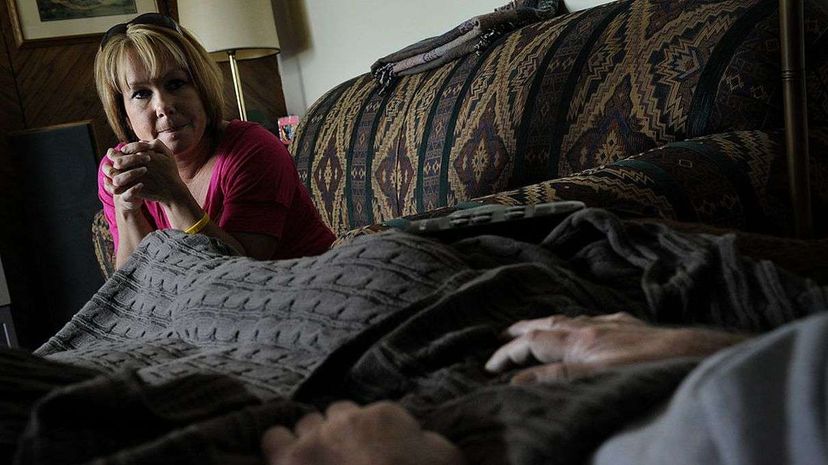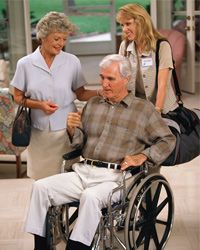
It's estimated that 52 percent of people turning 65 today will need some type of long-term care to help with daily activities like bathing, dressing, eating and going to the bathroom (though most will need it just for a year or two). As much as we'd like to ignore the inevitable, it's never too early to ask: Who will take care of you when you get old?
Adult children in the U.S. provide about half of all informal caregiving for elderly or disabled people (29 percent provided by daughters, 18 percent by sons). Spouses provide another 20 percent, according to the U.S. Department of Health & Human Services.
Advertisement
“Informal care is absolutely essential,” says Richard Johnson, director of the Program on Retirement Policy at the Urban Institute, a Washington, D.C.-based think tank. “It's a lifeline for most older people with disabilities. They could not remain living in the community without help from their children. Even when people go into nursing homes or other types of residential care, their children by and large provide them with a lot of hands-on care.”
But what if you don't have any kids? According to a February 2016 report from the Urban Institute, one in five American women born after 1970 will have no children at all. This declining fertility rate, coupled with the rapid aging of the U.S. population, poses some tremendous challenges for the future. In 2010, there were seven potential caregivers for every person older than 80. By 2050, there will only be three. So the question is, who will take care of the tens of millions of elderly and disabled Americans who have no children?
Johnson says that other family members play an important role. Siblings, nieces and nephews often step up to care for an older relative. Friends, too. Members of the LGBT community, for example, have long relied on extended family members and younger friends to provide informal care.
Even neighbors can be a wonderful resource. The New York Times ran a story about an older single woman without children who recruited two friendly neighbors in her building to hold power of attorney over her long-term care. They won't be dressing and bathing her, but they can help make arrangements for paid home care or assisted living.
Which brings us to the next long-term care option for people without children: paying for it. Home care nurses are expensive ($21/hour on average), but nowhere near as expensive as a nursing home, which costs an average of $6,235 per month for a private room. The same room in an assisted living facility costs $3,293. Overall, Johnson says there's been a steep decline in the number of older Americans entering nursing homes, which are now viewed as a “last resort.” But the opposite is true for people without kids.
“We know that people without children are significantly more likely to go into a nursing home than people with children,” Johnson says. “That's one of the challenges that's going to arise in the coming decades. It's likely that the decline in the availability of family caregivers is going to increase the demand and use of nursing homes.”
Nursing homes are not covered by Medicare, the government-run health insurance coverage provided for retired Americans. So most people pay for nursing homes out of pocket until their savings run out. Then Medicaid kicks in. You can buy long-term care insurance to help pay for a nursing home, but it's also expensive — an estimated half to two-thirds of Americans can't afford it. The average cost is about $3,000 a year for a typical policy if the buyer is in his 50s.
Luckily, one of the upsides of not having children is that you can save all of that money you don't spend on having children. The U.S. Department of Agriculture estimates the average cost of raising a child to be $245,340, and that doesn't include college.
“People who don't have kids have significantly more retirement resources,” Johnson says, “so they're in a better position to purchase care.” At least we hope so.
Whether you have no kids or six of them, it pays to start thinking now about how you would like to live out your last years and who you want to take care of you. Not everyone with kids wants their adult children to be responsible for them. Some don't want to “burden” their offspring. Many times the children live too far away to give day-to-day help. And, of course, some parents and kids are estranged from each other.
According to a 2012 survey from Fidelity Investments, 97 percent of parents and their adult children disagreed on whether the child would take care of a parent if they became ill. One reason for that disconnect is very few of families in Fidelity's study have actually had these conversations.
Even if retirement is decades away, it's time to start having frank conversations with children, nieces, siblings, friends and neighbors about who you want to care for you and in what setting. It might be the best insurance policy you can buy.
Advertisement

